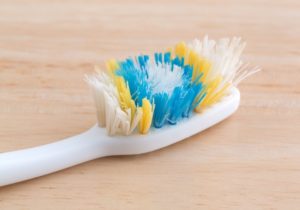How Often Should You Replace Your Toothbrush?
August 9, 2020
 Brushing your teeth is a crucial part of your daily hygiene routine. Something that you probably know is that your toothbrush does not last forever and should be switched out periodically for the best possible oral hygiene. But how often exactly should you be replacing it? Why is it so important that you invest in a new toothbrush from time to time? Continue reading to learn more from your dentist about when it’s time to replace your toothbrush and why.
Brushing your teeth is a crucial part of your daily hygiene routine. Something that you probably know is that your toothbrush does not last forever and should be switched out periodically for the best possible oral hygiene. But how often exactly should you be replacing it? Why is it so important that you invest in a new toothbrush from time to time? Continue reading to learn more from your dentist about when it’s time to replace your toothbrush and why.
How Often Should You Get a New Manual Toothbrush?
The Centers for Disease Control and Prevention (CDC) recommends that your switch out your toothbrush every 3-4 months with a new one. Once the bristles begin to lose their stiffness, it begins to lose its efficiency. When the bristles are unable to brush away food, you are not able to prevent buildups of debris, plaque, tartar, and bacteria nearly as easily.
You may need to switch out your brush sooner in certain situations. For instance, if you or a household member is sick, it is a good idea to switch out your toothbrush for a new one. This is especially the case of you have a viral or bacterial infection like strep throat.
How Often Should You Replace the Head of an Electric Toothbrush?
Just like manual toothbrushes, the heads of electric toothbrushes become worn after regular use. In fact, the bristles on electric toothbrushes are shorter than those on a manual brush. Because of this, the heads should be switched out approximately every 12 weeks, or earlier. Watch for signs of wear and tear on the bristles to know when it’s time to have it replaced.
How Do You Make the Most Out of Your Toothbrush?
In order to keep your toothbrush in good shape until it needs to be replaced, remember to rinse it completely with tap water after using it. There is no need to use a disinfectant to sanitize it after using; just a rinse will do. It’s not a good idea to keep your brush in a closed container because often times, this encourages mold and bacterial growth.
Never share a toothbrush with someone else, even if it is a close family member or significant other. Avoid letting the head of your toothbrush touch the heads of other toothbrushes because this can also spread germs.
Having the proper tools to keep your smile clean is a critical part of your oral hygiene routine. Remember to replace your toothbrush as needed. Your smile will thank you!
About the Author
Dr. DawnMarie DiGrazia provides a wide variety of services at Somerset Dental Arts in Somerville, NJ. She earned her DMD from the University of Medicine and Dentistry of New Jersey in 2002 but started her career in the field over 25 years ago. Dr. DiGrazia is a member of the Academy of General Dentistry and the New Jersey Dental Association. For more information on proper dental hygiene or to schedule an appointment, visit her website or call (908) 722-2999.
No Comments
No comments yet.
RSS feed for comments on this post.
Sorry, the comment form is closed at this time.
